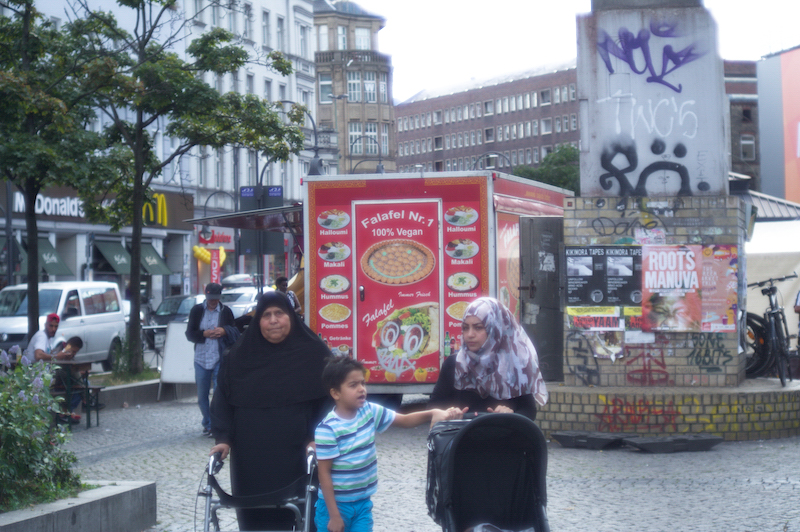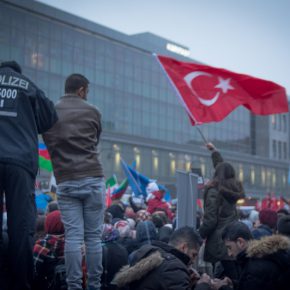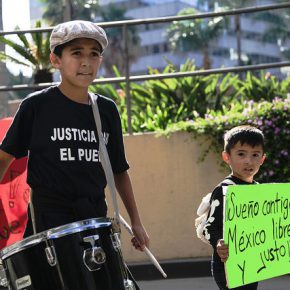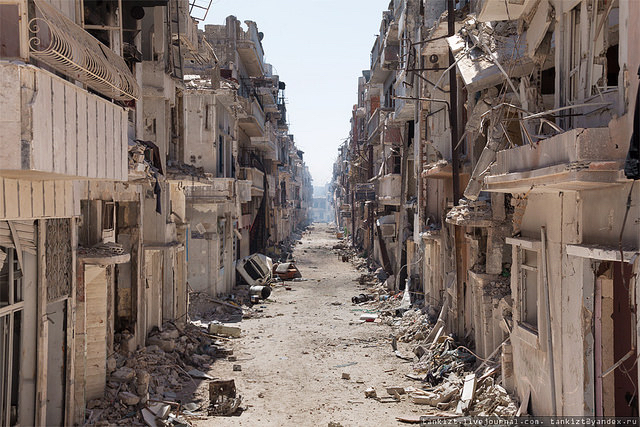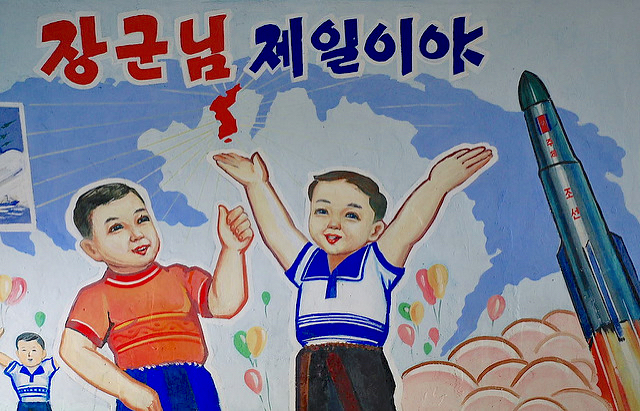AFTER SIX YEARS of conflict and extended exposure to trauma, Syria is in the throes of a mental health crisis, according to Chicago-based physician Dr. Zaher Sahloul, a Syrian-American trauma specialist and former president of the Syrian American Medical Society (SAMS).
Thousands of civilians live in besieged areas, like the Eastern Ghouta suburb of Damascus, without access to sufficient food, medicine or other basic supplies. In other areas, bombs and airstrikes not only compromise infrastructure by reducing homes to rubble, they also kill loved ones. In some Syrian towns, civilians endure both these hardships and many others.
Sahloul, who has traveled to Syria 14 times since the conflict began to provide medical care, has been a firsthand witness to the war’s impact on mental health.
“There has been a huge increase in psychological trauma since the start of the crisis, including depression and anxiety. Especially among the vulnerable populations, which include children, women, the elderly and the disabled,” Sahloul said.
Untreated mental health issues can lead to addiction, domestic violence, the disintegration of families and may even make adolescents susceptible to recruitment from gangs and terror groups, he added.
Syria Deeply spoke with Sahloul about the stigma associated with psychological illnesses in Syria, the impact of trauma on children and how to address the country’s mental health crisis.

Syria Deeply: What was the mental health situation like in Syria before the crisis?
Zaher Sahloul: Mental healthcare is not very developed in Syria. Before the crisis there were around 100 psychiatrists in Syria for 22 million people. Only five of those were child psychiatrists, and there were very few psychologists and community mental health specialists. The World Health Organization (WHO) estimates that 50 percent of physicians have fled Syria because of the war, so when you extrapolate that, there are now maybe 50 psychiatrists still in Syria.
In Syria, people are stigmatized if they have mental health issues. People who suffer from even common mental health conditions like anxiety or depression refuse to seek help or take medication because of the stigma that they will receive from their family members and society. People with mental health conditions are called “majnun,” which means crazy in Arabic.
Culturally, mental health is viewed as being related to the satanic. People who have mental health issues are believed to be possessed by a demon, and therefore people seek treatment by going to the local imam or priest, where religious rituals are performed or herbal medication is given.
Mental health issues are often presented as a physical illness, so instead of saying that they are suffering from anxiety or depression, patients will complain to a healthcare provider that they have back, neck or abdomen pain. The physician will treat these symptoms instead of the underlying issue of anxiety or depression. This does not treat mental health problems.

. This is why people do not seek early treatment and why they refuse to take medications. This stigma also led to a lack of funding for mental health programs or training for people to become counselors or psychologists, so there were no local heroes for mental health [treatment] in Syria.
Syria Deeply: Have mental health problems increased with the Syrian crisis and if so, how has this impacted healthcare?
Sahloul: There has been a huge increase in psychological trauma since the start of the crisis, including depression and anxiety. Especially among the vulnerable populations, which include children, women, the elderly and the disabled. This increase stems from the violence they have witnessed, the loss of family members, the loss of their homes, the lack of food and displacement.
Syria Deeply: Why are the most vulnerable populations most impacted by mental health issues?
Sahloul: I think that because of societal expectations, non-vulnerable populations, like men who are expected to be tough, are less likely to [display] symptoms of depression and anxiety. They are expected to behave in a certain way and therefore they adapt differently. But children cannot adapt to PTSD or anxiety, so they show clear symptoms like bed-wetting, nightmares and social withdrawal. We are seeing the same thing with women and elderly people.
Syria Deeply: What impact has six years of war had on the mental health and brain development of children?
Sahloul: There are multiple factors that affect the development of brain function and mental health in children in Syria. There is extreme stress related to violence, the loss of family members and witnessing multiple episodes of destruction of your home and neighborhood. During my last trip to Aleppo, I saw a little boy who told me that he was depressed because he couldn’t go to school. For children, school is a mechanism for normality, because it is a place to meet with friends and focus on studying instead of focusing on the bombings going on around them. The lack of schooling adds to the stress for children.
Children who live under siege not only lack access to schooling, but also lack access to proper food. In Ghouta, there are 400,000 people living under siege, and children account for half of that population. They don’t have access to proper food, so children are eating grass, leaves and they have also been forced to eat cats and dogs. This is traumatic because eating cat or dog isn’t allowed in Islam, but they have no choice. When I was last in Aleppo I went to an orphanage, and one of the children was worried that they would be forced to eat grass and leaves like the children in Ghouta.

All of these things add up and cause issues with mental development and mental health. My suspicion is that we will see widespread incidents of mental health problems developing in the areas where children witness bombings and violence. For children, this can have a lasting impact on their lives because, left untreated, mental health issues can affect how they interact with people: They can increase domestic violence, addiction, and job loss, and make these children fertile ground for recruitment to gangs and terrorist groups who exploit mental health conditions.
Syria Deeply: How do terrorist groups exploit mental health problems among adolescents?
Sahloul: Children who are withdrawn because they have lost family members and no longer have family support, and because of psychological trauma, can fall prey to terror groups who promise them the support systems that they are lacking. These terror groups indoctrinate them [in a way] that makes it easier to deal with mental health issues, such as the belief in ultimate victory or promises of an afterlife. This is a strong coping mechanism for societies where religion plays a major factor, and terrorists use this indoctrination to deal with mental health issues within their group. Sometimes people with mental health problems who display aggression will gravitate towards groups that promote violence because these groups allow them to vent their aggression through violence.
Syria Deeply: How can the mental health crisis be addressed in both adults and children in Syria?
Sahloul: It is a matter of resources and priorities. If we don’t address the mental health crisis early, the scars will stay for a long time and it will be [more] difficult to treat, especially in children. It is very important that when there are bombings, violence, grief over the loss of immediate family members, that psychiatric aid and counseling are provided right away.
The WHO and U.N. agencies have to prioritize mental health among Syrians, and the same goes for the Syrian government and the opposition, who control some parts of Syria. Right now, mental health is not a priority for the U.N. agencies and WHO because the crisis in Syria is relentless, and there is a lack of resources. When you are in a country at war, mental health is the last priority.
Right now, we need to study this crisis to understand what is going on in the camps and within Syria, and then try to figure out the most effective tools to address this. We need a Marshall Plan for how to address mental health in Syria and then we need to tackle it by starting with the most vulnerable populations.
We can start by addressing the lack of mental health professionals by having more scholarships and directing more efforts at encouraging people to have careers in this profession. My organization, SAMS, started a teaching-recovery techniques program in the Syrian refugee camps in Greece, where we trained community leaders, such as teachers, to recognize and address mental health issues. Programs like this can be very helpful.
This article originally appeared on Syria Deeply, and you can find the original here. Photographs courtesy of Joel Schalit.
